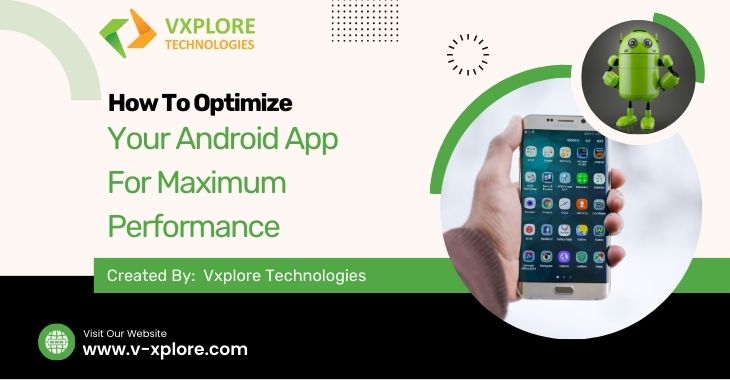Ensuring a high-performance experience is crucial for the success of any Android application in the current competitive app market. Consumers expect seamless navigation, quick loading times, and economical resource usage from their devices. Consequently, in order to differentiate your Android app from the competition and keep customers, you must optimize it for optimal performance. If you are looking for an Android App Development Company, contact Vxplore Technologies. It can offer you the best Mobile App Development Services In kolkata.
Let’s discuss the points:–
- Profile and Identify Performance Bottlenecks
- Optimize App Startup Time
- Optimize UI Rendering
- Optimize Network Requests
- Optimize Memory utilization
- Optimize Battery Consumption
- Optimize APK Size
- Test Across Various Devices and Android Versions
Profile and Identify Performance Bottlenecks:
Before you start optimizing, it’s critical to pinpoint the parts of your program that are generating performance problems. To examine CPU, memory, and network utilization, use profiling tools such as Android Profiler or third-party tools such as Firebase Performance Monitoring. This might assist you in identifying bottlenecks and prioritizing optimization efforts.
Optimize App Startup Time:
Getting rid of app startup times is essential to a smooth user experience. Reduce the amount of pointless initialization processes for the program, such as lengthy computations or network queries. Use strategies like background initialization and lazy loading to push off non-essential work until after the program has launched.
Optimize UI Rendering:
User pleasure depends on a responsive and seamless user interface. Use tools like the Layout Inspector in Android Studio to find and eliminate layout hierarchy inefficiencies. Optimize the drawing operations in your app to take advantage of hardware acceleration and minimize overdraw. Furthermore, consider RecyclerView for effective rendering of lists and grids and use RecyclerView’s ViewHolder pattern to reduce the overhead associated with creating new views.
Optimize Network Requests:
Network operations can greatly impact app performance, particularly on slower connections. Reduce latency by minimizing the number of network queries and using strategies like request batching and caching. Use techniques like HTTP/2 and GZIP compression to maximize the effectiveness of data transfer. For dependable and effective networking in your application, consider utilizing frameworks like Retrofit or OkHttp.
Optimize Memory Utilization:
Excessive memory utilization can cause apps to crash and performance to deteriorate on smartphones with little RAM. Use tools like Android Memory Profiler to find memory leaks and improve object allocation. Use strategies like resource recycling and object pooling to reduce memory overhead. Additionally, to effectively manage UI-related data and avoid memory leaks, consider utilizing the ViewModel and LiveData components of the Android Jetpack.
Optimize Battery Consumption:
Apps with poor optimization can quickly deplete the device’s battery, which is inconvenient for the user. To extend the life of your battery, reduce background processing and use background tasks sparingly. Use features like App Standby and Doze mode to maximize power usage when the smartphone is idle. Use the JobScheduler API for Android to effectively schedule tasks and lessen the impact on battery life.
Optimize APK Size:
Huge APK files take up valuable storage space, complicate installation, and take longer to download. To make your APK smaller, use methods like resource shrinking and code shrinking (ProGuard/R8). To further reduce download sizes, use Android App Bundles to create optimized APKs suited to each device setup.
Test Across Various Devices and Android Versions:
Ensure your app works well on various Android versions and devices. Use emulators or device farms to test your app across a range of hardware combinations and screen sizes. To replicate actual usage scenarios, test performance in a range of network circumstances. For thorough automated testing, use Firebase Test Lab and Google Play’s pre-launch report.
Conclusion
Maximizing the speed of your Android app is a complex process that requires close attention to detail and a deep comprehension of the nuances of the Android platform. If you are looking for an Android App Development Company, contact Vxplore Technologies. It can offer you the best Mobile App Development Services in Kolkata.




